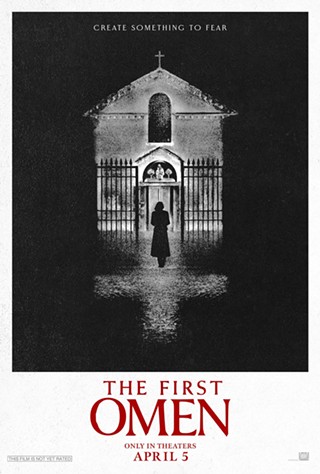After 12 years behind bars, Dom (Jude Law) is a little pent-up. That explains his simmering anger, his frequent outbursts and his graphic Shakespearean ode to the sexual powers of his own endowment. The monologue on manhood, an infinitely quotable scene, comprises the first two or three minutes of Dom Hemingway, and it's an effective guide to whether this movie is up your alley.
There's good news for Dom today: He's a free man. After not rolling over for his boss, Mr. Fontaine (Demian Bichir, an Oscar nominee a couple of years ago for his work in A Better Life), Dom believes he's owed big time. While he was away, he missed his daughter growing up and couldn't be there when his wife died of cancer. That, in addition to the 12 years and keeping his mouth shut about Fontaine, should be worth something. Plus interest.
There are a number of angles writer-director Richard Shepard could introduce here, but he largely keeps Dom Hemingway a dark comedy, albeit a haggard, atypical one. And while a number of Dom's escapades get him into comedic situations, Shepard leaves the faucet running a little too long, trying to get a lot of laughs all at once. When Dom tries to make up for 12 years without cocaine and hookers in three days, it leads to quite a hangover, which in turn leads to quite a monologue. There are a few extended speeches here; maybe it's just a mannerism Shepard has chosen for his characters. But it feels really unnatural when Hemingway's rants start. And worse when they don't end.
Shepard has avoided this kind of stylistic overload in the past. The Matador—a similarly themed flick from 2005 about a past-his-prime assassin—has great dialogue and balances the life-and-death world the characters inhabit with tongue-in-cheek comedy. Dom Hemingway doesn't quite make it there. The screenplay is listless between the bigger scenes, and there's not much to do but tread water for supporting characters like Fontaine and Dom's best friend, Dickie (Richard E. Grant). Even Dom's reconciliation with his daughter feels pretty transactional; there's a lot of ground to cover here that the film simply never bothers to explore.
But when Dom Hemingway is locked in, it's very funny, and that's largely the doing of Jude Law. If you can, get in your Wayback Machine and set a course to the late 1990s. Law was perfect in The Talented Mr. Ripley and The Road to Perdition and the only saving grace in Steven Spielberg's bloated A.I. Since then, he's become the actor we more commonly think of, mostly pedestrian save for his sparring with Robert Downey Jr. in the Sherlock Holmes movies.
This is an opportunity for Law to go for broke and he does. It doesn't resemble any of his previous performances and Dom doesn't look very much like Jude Law, either—paunchy, unkempt, unrefined and embracing his vanishing hairline. So for the actor, at least, this is a victory. Is that enough? Probably not.
No matter how brazen or reaffirming a central performance is, if it's the only thing in a movie that the writer paid much attention to, you're not going to have a very memorable film. Large chunks of Dom Hemingway don't have any weight to them, and entire characters—and one entire subplot about Dom cracking an electronic safe for a rival gangster—are barely part of the equation. At least they got the title right.










